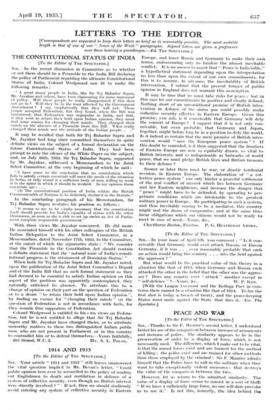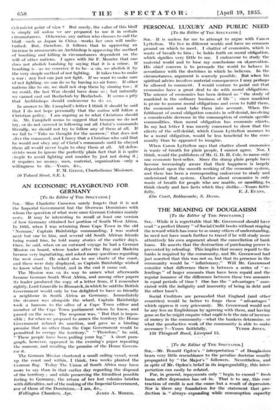PEACE AND WAR [To the Editor of TILE SPECTATOR.] SIR,—Thanks
to Sir F. Maurice's second letter, I understand better his use of the comparison between increase of armaments and increase of police. The similarity appears to lie in the preservation of order by a display of force, which is not necessarily used. The difference, which I make out to be vital, is that the armed forces exist -and are trained for the method of killing ; the police exist and are trained for other methods than those employed by the criminal : Sir F. Maurice admits himself that the Police have to call in the military when they want to take exceptionally violent measures : that destroys the value of the comparison between the two.
However, let us return to the admitted similarity. The value of a display of force seems to consist in a sort of bluff; " If we have a sufficiently- large force, no one will dare provoke us to use it." Is not this, honestly, the idea behind the eefensivist point of view ? But surely, the value of this bluff is simply nil unless we are prepared to use it in certain ircumstances. Otherwise, any nation who chooses to call the bluff—such as Japan in China—works her own will undis- t urbed. But, therefore, it follows that in approving an increase in armaments an Archbishop is approving the method of bombing and killing in circumstances dependent on the will of other nations. I agree with Sir F. Maurice that one does not abolish bombing by saying that it is a crime. If bombing is—as we conceive it to be—a sin, we abolish it by the very simple method of not fighting. It takes two to make a war ; any fool can just not fight. If we want to make sure of not fighting, we can do so by having no air force. If other nations like to sin, we shall not stop them by sinning too ; if we could, the last War should have done so ; but naturally we cannot cast out Beelzebub by Beelzebub. It seems a pity that Archbishops should endeavour to do so.
In answer to Mr. Campbell's letter I think it should be said that I do not hope personally that the nation will follow a Christian policy. I am arguing as to what Christians should do. Mr. Campbell seems to suggest that because we do not try, or do not succeed in following out all Christ's commands literally, we should not try to follow any of them at all. If we fail to " Take no thought for the morrow," that does not alter the command, and I fancy that a Christian who said that he would not obey any of Christ's commands until he obeyed them all would never begin to obey them at all. All defen- sivists seem to ignore the perfectly plain fact that it is quite
imple to avoid fighting and murder by just not doing it ; it requires no money, men, material, organization—only a willingness to die.—Yours, &c.,







































 Previous page
Previous page